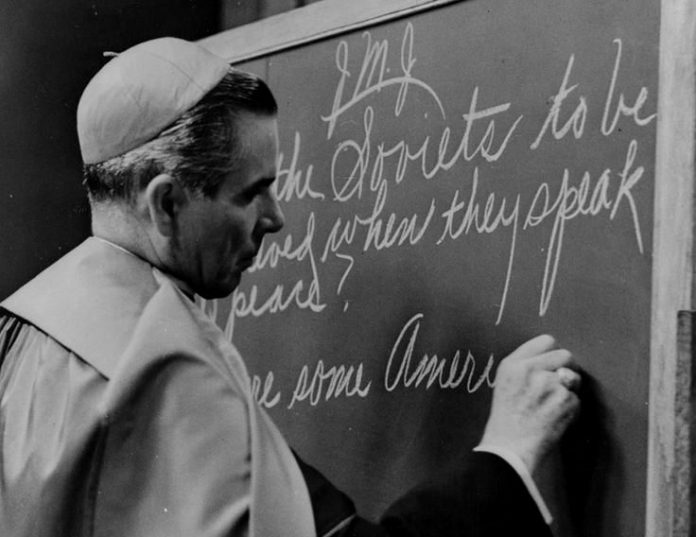The Venerable Archbishop Fulton J. Sheen (1895-1979) needs little introduction. At the peak of his radio and television popularity from the 1940s to the 1960s, his fame eclipsed even that of the celebrated Protestant evangelist Billy Graham. Pope Francis has approved the beatification of Archbishop Sheen following documentation of a miracle through his intercession. A second miracle is required for the sainthood of the first American bishop. The following treatment of Sheen’s little book Thoughts for Daily Living (1951) is a small window into the large spiritual genius of the most famous American Catholic.
On Happiness
In a reflection titled “Happiness” Sheen notes that, above all else, two things are required for a happy life: first, a lofty sense of one’s purpose for living; second, the rejection of living for oneself alone. The first requirement is that we have a grasp of truth; not just any truth, but divine truth, perfect truth, the truth that teaches the supremacy of love above all else. The second requirement is that we abandon “crushing egotism and selfishness,” which gives our love to ourselves and denies it to others. By acknowledging the truth God offers us, the “sluice gates of heaven open” to pour out grace upon our lives. Upon receiving that grace we learn that we can only begin to be happy when the ego dies and is reborn again in the wisdom of knowing and loving more fully God the Father, the Son, and the Holy Spirit.
On “Bad” People
In his essay titled “There’s Good in the Bad,” Sheen explores our need to find a grain of good in everyone, because that grain is always there. No one is totally evil. Find the good and encourage it to be better. The repulsive aspects of people make us tend to condemn them wholly and not want anything to do with them. But this is a missed opportunity for conversion, and conversion is possible. A long series of zeros are worth nothing. But put the number 1 in front of them and the zeros explode into something of positive value. Or as Leon Bloy put it, “One step beyond mediocrity and we are saved.” This instinct to find good in everyone is reflected in the sentiment that most people share when they say “Speak no evil of the dead.” Grant them the possibility of at least one grain of virtue that might have saved them at the end.
On Knowledge vs Character
Sheen looks at the worship of knowledge in “Knowledge Alone Is Dangerous.” He points out that “A civilization which puts a high premium upon education of the mind is in danger of forgetting the training of character.” One can agree wholeheartedly with Sheen’s observation that the place where knowledge is most prolific, the university, is the place where you might expect to find what we call “fraternity and brotherly love.” But professional rivalry is endemic among the professors, and all the more so among those who are puffed up with the notion that they and they alone know it all. “Knowledge indeed is power, but it can be power for evil as well as good…. We are now safeguarding ourselves from the knowledge that the atom can be split. But it will take some love to prevent us from using that knowledge to blow up the planet.” Everyone knows it was the professors of physics, not the bishops, who were consulted about building the bombs that obliterated Hiroshima and Nagasaki, and may yet wipe out modern civilizations worldwide.
Good on the Inside
Sheen rejects the modern popular notion that it makes no difference what we believe; only what we do counts. This is, of course, absurd. Virtually all the goods and evils of the world are rooted first in what we believe, in what we think. If our thoughts are pure, our actions will be pure; conversely, impure thoughts lead to impure actions. But we are not going to have pure thoughts unless we want to have them; they cannot be drilled into us by rote memorization. The environment in which we live can do only so much to impact that desire for purity. Adam and Eve had a great environment at first; but the environment did not stop them from impure desires, which brought about the Fall. Though environment is important, there is no use blaming our environment for our sins, as Eve blamed the Serpent. Rather, we are free from the inside to be good and to repulse the Devil’s call to evil actions.
Wanting to Be Good
According to Sheen, “There is only one reason why we are not better, and that is because we do not will to be better.” The Catholic creed tells us that Jesus had to descend into hell before he could rise from the dead. In like manner, we must all visit the hell of our own subconscious mind to find out what it is there that must be overcome before we can be spiritually resurrected. Unfortunately, most of us are too cowardly to make that descent into the dark and sinister unknown of our hidden selves where we dwell prostrate before the altar of our own egos. We are afraid to confront the truth, aware that it holds in it something of self-restraint and sacrifice that we have to experience in order to grow into a person better than ourselves. We are like Pilate who, not wanting to confront the question of who Jesus really was, cynically asked him, “What is truth?” and would not stay for an answer. He did not really want one.
What Is Character?
Sheen asks the question that all civilizations have tried to answer. What is character? In the ancient Greek world Aristotle defined it as moderation. Avoid all extremes of thought and behavior, and thereby avoid trouble. The Renaissance man described character as the virtue of possessing a wide view and mastery of arts and sciences. The Romantics in the time of Rousseau regarded character as the supremacy of vibrant feeling over cold intellect. The communists of the 20th century regarded character as the demonstration of complete conformity and obedience to the totalitarian State. Only Christianity regards character as belief in and loyalty to the word of the Lord. The Christian character is mainly defined by the capacity to love. The Christian ideal of character surpasses all other definitions of character, because the Christian “knows that he can never conform to his lofty Ideal unless he takes a chisel into his hand and cuts off huge chunks of egotism and selfishness, from the marble of his nature.” The Christian who lives for others as well as self lives a noble life of character.
Sex and Death
Sheen regarded the 20th century as a century obsessed by sex and death, and there is no greater fusion of both obsessions than in the works of Sigmund Freud. But both obsessions, rooted in natural behavior, have been made degenerate by the fact that both discount sex and death as the doorways to new life, both in this world and in the next. Rather, sex and death are seen as ends in themselves, terminal points in human destiny. It is inevitable, therefore, that our concern with them will be obsessive and best summarized in the command of the poet Baudelaire: “Love as if sitting on a skull.” Sheen does not see how any such philosophy can result in anything but a gross animalism. Animals do not believe in God. They are not supposed to. Humans are not supposed to behave like animals because they do believe in God. “Hence, in a healthy society, neither death nor sex are obsessions, for the simple reason that neither love nor life is exhausted here below.”
Forgiveness Not Enough
Sheen explores the idea that it is good to forgive a wrong done to us. That makes the wrongdoer feel better, and it is a sign of nobility in the one who forgives. But forgiveness neither makes the wrongdoer whole nor the one wronged whole, unless it is accompanied by restitution by the wrongdoer to the one wronged. A boy who knocks a baseball through a neighbor’s window needs to say not only that he is sorry, and the neighbor needs not only to say the boy is forgiven, but the boy needs to pay for the broken window. The same principle, by the way, applies to purgatory, which is the payment we must undergo when we receive God’s forgiveness of the sins for which we have repented. Purgatory makes us whole, just as paying for the broken window (or maybe a hundred broken windows) makes a boy whole. Ten thousand mortal sins paid for in purgatory makes us whole in the presence of God. “The forgiveness of God is one thing, but the proof that we want that is the energy we expend to make amends for the wrong.”
The Pharisee and the Publican
Jesus points to the Pharisee who prays to God, “I thank thee, that I am not as the rest of men.” He exults proudly in his goodness, never allowing that the sin of Pride brings him down below the level of those who commit lesser offenses. As Sheen puts it, “What sin is to a soul, that an infection is to a body. Bad blood comes out in boils; bad morals come out in discontent, anxiety, slander, and a thousand other signs of mental maladjustment.” Now the Publican standing in the back of the Temple prays fervently, “Lord, be merciful to me a sinner.” But the Publican knows what is the worst thing in the world: to deny that one has sinned. This is the surest path to finding abundant sins in others and acquiring a kind of destructive cynicism about the world outside ourselves, while we assure ourselves that we are the apple of God’s eye. Sooner or later we come to think of ourselves as not even needing God to affirm our goodness; and as our religion declines, we slide down that proverbial slippery slope to spiritual suicide.
Is Religion a Crutch?
No, it is not a crutch. It is a cross, says Sheen. Religion does comfort, yes, but it also puts burdens on us: the burden of responsibility not just for ourselves, but for others. It is the unbeliever who rests upon the crutch of his own ego to ease himself through life, who will live off “his own moral fat and be dependent on nothing outside himself.” The believer must be prepared for the mockery of the unbeliever. The believer must think more honestly than the unbeliever. For it is the unbeliever who sees something to be a crutch that, if he looked more closely, he would see to be a cross; a cross welcomed because it is better to carry a cross and be saved by that cross than to be an escapist and lean on the crutch of disbelief and perish from the supreme and lonely love of self.
Sorrow and Anguish
There may well be much more sorrow and anguish in the world today than ever before. One only has to look around, or just look in a mirror, to see it. Sheen’s metaphor is perfect: “Each moment we bump into the walls of the universe and skin our shins on its fences.” We have an infinite craving for finite things we can never grasp because they are too many for us to get our arms around; but we have a small and finite and sometimes even non-existent craving for the One who is Infinite. It is for this reason that we have sorrow and anguish, and beyond that we have anger should the world not submit to our craving. But all we should have to do is realize and submit to the law of our nature, the law that God put in our hearts: to yearn for and accept the love God give us. It is good that we are sorrowful. Sorrow is a sign that we are not fulfilled, a sign that whatever we ought to yearn for we have not found because we are looking in the wrong places. The pessimism that follows our failure to be fulfilled is a sign that we need to lift our hearts to a loftier goal than all the riches and pleasures of this world. Hope is a most precious gift of grace, for it opens the door to all those other gifts that God wants to give us: most of all, the gift of love and peace of soul.
Rash Judgment
Rash judgment is a flaw shared by most of us. We are quick to critique others and slow to examine our own defects. A common trait of reformers is that they want to reform others, but will not imagine they need to improve themselves. These are the so-called “Progressives” of the world. Every totalitarian State is loaded with a bureaucracy of these broken souls, the Communists most of all. “As it has well been said, there are no monuments in the world built for critics.” Only creative people of the good, the beautiful, and the true get a monument built to them that will not be torn down in anger by a later generation. This craving for critical and rash judgments may have its psychological roots in the notion that by tearing down others we actually build ourselves up. But if we have honestly examined our own faults, we will tend to be kinder toward the faults in others. Not that we should let others off the hook, but that we should be less harsh in the way we treat them. Every priest in the confessional knows well enough his own sins, and by knowing them so well, he is able to help others unburden themselves of theirs without making them feel unworthy of the forgiveness Christ offers.
How to Read
When universal literacy became possible through the invention of the printing press in the Middle Ages and later the creation of public schools, it was hoped that the vast bulk of the world’s problems, but especially ignorance and poverty, would be eliminated. To a degree that has happened in many countries. But now there are vastly too many books to be read, and life is short. So it is mandatory that, following Rule #1, we should decide which books are worthy to be read, and which books we can do without. When making this decision, Rule #2 is that we should not suppose the latest book out is worthy to be read because the latest book is not necessarily among the best to be read. “It is not nearly as important to read what is just off the press as it is to read something that needed to be reprinted after a lapse of time. We can save ourselves many a wasted effort if we wait to see whether the test of time has served the book so well that many others have helped us to judge its worth. Rule #3, and this is perhaps the most important rule, is that we ought to read books that are substantial rather than frivolous; books that inform us of good values that will lead us to positive action, rather than romantic novels that stir up dreamy or melancholic emotions that help us go nowhere in real life. Overly dramatic literature too heavily indulged in can stifle our emotions and our imaginations, and even our will to positive actions in real life. As Sheen remarks: “One of the reasons why so many are left cold at the cruel injustices of the world, and are unmoved by the multiple tragedies, is because their emotions are already jaded and worn.”
Controlled Speech
One of the most difficult things in the world for people who lack self control is to hold their tongue when about to blurt out explosive sentiments. Such eruptions of speech might be mitigated by the speaker being mindful of the old adage, “Speak the truth and ride a fast horse.” Perhaps better advice, Sheen suggests, is to “Think before you speak; then talk to yourself.” Speech is the source of more troubles than anything else. But if we speak well, if we always kindly and wisely tell the truth, we will do well. Speech, like actions, cannot be divorced from morality. That is why the speech of a liar is so offensive; it gives rise to false actions, as when in the 20th century the Fascists and the Communists lied about God and went about slaughtering millions of believers. Sheen concludes: “When a patient goes to see a doctor he says: ‘Let me see your tongue.’ We have a Divine assurance that something like that will be said by the Divine Physician on the last day.”
The Psychology of Despair
Sheen opines that the root cause of despair is the unwillingness to aspire to the Infinite. Lacking that aspiration, humans fail to fulfill the supernatural longing planted in their breasts by God. “Snails, snakes, and scorpions cannot despair; neither can cabbages, camels or centipedes. Only man, with the infinite and the eternal in him, can despair.” Despair is the opposite of the hope we have to attain “truth and love and beauty,” which are the pursuits of humans and humans alone. But truth and love and beauty are realities of the temporal world that are somehow connected to the eternal world for which we were made. If these realities are not achieved in this world, we are assured by the virtue of hope that we have the opportunity to achieve them in the next world. But philosophers today like to tell us there is no next world; that the only thing really worth believing in is economic security. Hence the decline of religion and the rise of atheistic socialism everywhere. Lacking belief in the eternal world of truth and love and beauty, and lacking the achievement of these realities in this world, only despair remains. This is why the modern world is filled with psychiatrists and so many patients in need of them. Yet the field of psychiatry, which too is riddled with atheists, often fails to be a solution for souls in the agony of confusion and despair. Despair of achieving infinite and eternal happiness means that only the finite goods of this world are worth pursing. Sheen concludes: “The rapidity of wars, the almost incessant revolutions which disturb our modern world, are born of that frantic despair to salvage something before the world is taken away.”
What Is Freedom?
Everyone knows what freedom is until you ask them to define it. There is a huge difference between the freedom from want and the freedom to worship as you like. “Freedom from want and freedom from fear are examples of negative freedom; they tell nothing about what man is to do with his freedom.” Then again, Jesus talks about the “Truth that will make you free.” He was not talking about the truth of a mathematical theorem, which is not anything you can really love; but rather about the Truth that was in Him, which you can always love. There is an illusion among some that laws against immorality impinge on our freedom to behave as we like. Yet it is noticed by many that being “free” to behave as we like often makes us slaves to our passions. The freedom to drink whiskey can devolve into alcoholism, which may be summed up as the inability to freely choose between whiskey and water. Voltaire said liberty is obedience to law. Anyone who thinks that is foolish is likely to end up behind bars. Finally, the truths that matter most are the ones we can freely choose. When all our choices are made for us in a socialist or communist state, when all our values are decided for us before we are born by men, not by God, our lives are predestined to follow the will of the human Dictator with the biggest stick. As history records, that stick has been used to break many a head.
Is Religion Popular?
Sheen noted that Christianity is different from all other religions. “In all other religions, man moves to God as the first of of all movements; in Christianity God moves to man and then man responds to that first impulse.” All other religions are philosophies composed by men who make no pretense of even talking to the gods; Christianity is God revealing himself to us, and we accepting or rejecting that revelation. This is why we see more in-common characteristics among the philosophies of the Confucians, the Buddhists, and the Taoists; but none of those three are able to make the claims of Christianity: that their dogmas come not from men but from the mouth of God. Only in Christianity do we find that our ultimate destiny is nourished by a providential God, that we are nothing without joyfully accepting Providence and the promise of eternal life. By comparison, other major religions are dry celebrations of man’s futile effort to elaborate a complex theory of everything that dwells philosophically on the mysteries of life but in the end leaves us bereft of hope and joy. It was this hope and joy that is embodied in the saying of Jesus: ‘I am come that you may have life.’ But we have to be born again to have that life. And so Christianity will always be popular with those who want to have a more abundant life, but Christianity will always be less popular or not popular at all with those who wholeheartedly are drawn to the culture of death. Jesus sums all this up in one sentence: “I have taken you out of the world, therefore the world will hate you.”
Is Religion an Ambulance?
Sheen puts his finger on a profound insight: that the progressive liberals of the world regard religion as useful, not because it is true, but because it can be enlisted to back certain social movements and reforms. Religion may be allowed to “lend a helping hand” and provide emotional impetus; but beyond that, when the reform or the movement has achieved or failed to achieve its goal, “When things begin to cool off, the need for an emotional impetus ceases.” However, for Sheen, “religion is not a set of ideals, but a practice; not an exhortation to sluggish wills, but a cathartic to evil…. Religion is concerned with reality, with what men really are in the depths of their souls and as God knows them as their consciences stand naked before Him.” When all the dust has settled upon the progressive ideals of the secularists, Christianity will still be there. And yes, it will serve as an ambulance to carry us to the Divine Physician; and on the side of the ambulance will be inscribed in huge black words the name of his hospital: MOUNT CALVARY.
Cosmic Suicide?
Sheen begins the essay on cosmic suicide by noting the prophecy of the atheist philosopher Nietzsche regarding the 20th century which was fast approaching. “I herald the coming of a tragic era…. We must be prepared for a long series of demolitions … devastations and upheavals … there will be wars such as the world has never seen … Europe will be enveloped in darkness and we shall watch the rise of the black tide. Thanks to me, a catastrophe is at hand. A catastrophe whose name I know, whose name I shall not tell … then all the earth will writhe in convulsions.” And so it did with two World Wars and revolutions galore. Nietzsche knew the atheism he espoused would have a profound effect on Europe, and he may well have suspected that it would be followed by the militant atheism of international Communism. Nietzsche could not know that the atomic bomb would change history forever, and that its mushroom cloud still hangs threateningly over the entire world into the 21st century. Very naturally we fear nuclear weapons; but, Sheen suggests, atomic bombs are not to be feared nearly so much as the godless men who may someday plan to use them.
Christianity Too Easy?
There was a time when Christianity was found to be too hard. At that time it was very popular. The question before us now is whether, because Christianity has become too easy, it will cease to be popular. The world of morals has been watered down, and Christianity has accommodated the watering down. Sermons no longer address the hard issues that people do not want to think about, and this because they have been persuaded by the secularists that everything should be tolerated, including the abominable. Once it is discovered by the secularists that Christians are warm toward toleration, they will test that warmth. One moral precept after another will fall because so few are willing to carry the moral flag into battle and struggle against the forces of darkness. Modern folks, in search of a cause for which to fight, will only find insipid passivity in the churches. Whereas among other vibrant causes, such as militant atheism, will be found a radical willingness to fight and conquer. But true Christianity is no easy ride to virtue and salvation. “Let him who thinks that Christianity is an escape take a look at crucifixion as the condition of a resurrection and full union with the Heavenly Father. When Christianity is found to be hard, it will be tried.”
More Than Brains
The ancient age of tools found in excavations around the world tell us that man’s intelligence is very ancient, for only humans have invented tools. There is a rough equivalence of old age found also in the history of art. The earliest humans painted pictures of horses on their cave walls. The earliest horses never painted pictures of men on their barn walls. Art and tool-making are the singular ancient signs of the only creature who ever was and remains a creator. As the lion is king of the jungle, in the animal kingdom, the human is king of all animals everywhere. His haughty brain sets him aside as the one animal who, if he wished, could destroy all life on earth. But that same haughtiness has encouraged him to believe he could destroy all the gods. With a flick of his intellectual wrist, he commits Deicide with delicious impunity. But then he loses his special status as king, because he becomes only an accident of Nature, rather than the anointed apple of God’s eye. The less man sees of divinity in himself, the more he sees of the beast, and so the more he is likely to be at war with himself and his brothers. Modern science constantly searches for that brute who has come to be named the Missing Link. But this will get us nowhere. “The line of advance toward peace is not by contacting the beast from which our body might possibly have come, but by contacting God, from Whom our soul has certainly come.”
Who Owns the Future?
A special aspect of our human nature is that we not only have a sense of the present and the past, as other animals have, but we have a heightened sense of the future. We can even project our thoughts into eternity. All striving is not for the present nor for the past, but for the future. Consider the fate of those who believe they have no future. More than that, consider the fate of those who believe there is no eternity ahead of them. The “not yet” determines how we will behave in the “now.” The desire to be fed and sheltered in the “not yet” determines how we will earn and save our money in the “now.” If we live only in the now, our future is doomed. So it is with the fate of our immortal soul. We must earn and save for the eternity that is “not yet.” Or, as St. Augustine put it: “Our hearts are restless [now] until they rest in Thee [not yet] O Lord.”












